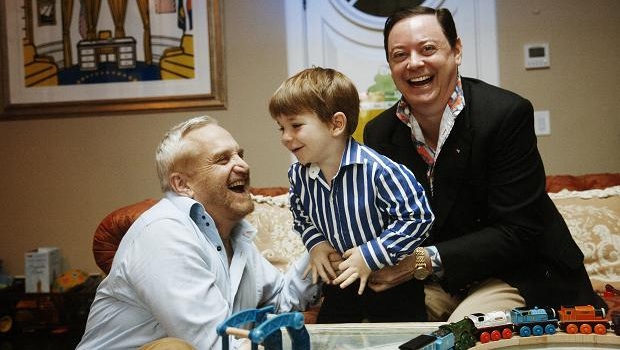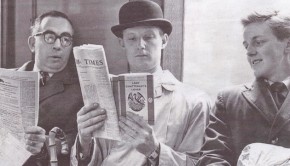Far from the Tree by Andrew Solomon
| Press reviews | Buy the book | Have your say |
Blurb: In this study of family, Andrew Solomon tells the stories of parents who learn to deal with their exceptional children and find profound meaning in doing so. He introduces us to families coping with deafness, dwarfism, Down syndrome, autism, schizophrenia, disability, with children who are prodigies, who are conceived in rape, who become criminals, who are transgender. While each of these characteristics is potentially isolating, Solomon documents repeated triumphs of human love and compassion to show that the shared experience of difference is what unites us.
(Chatto & Windus 2013)
David Aaronovitch, The Times
“[A] transforming book … [The] ability to accept the unexpected child is, Solomon says, quite recent — and we should be proud of it. It’s partly down to the TV shows on transsexuals, dwarfs, etc, which have brought to light what were secret tragedies. And it’s partly due to the long tail on the battles for rights for blacks and women — now “extended even to populations too disenfranchised to make their own claims”. Populations made a bit more fortunate, maybe, by this beautiful book.”
Sam Leith, The Spectator
“Solomon writes very well and has done a mind-boggling amount of work … His aim seems to be to bring sympathetic common sense to bear, to allow lived experience to trump theory, and let human beings, in all sorts of circumstances, tell their own stories. Nobody could read this extraordinary, moving book and not feel enlightened, but above all enlarged by it.”
Read full review (£)
Tim Adams, The Observer
“[An] extraordinary book … In my experience of the past few days you don’t so much read Far from the Tree as cohabit with it; its stories take up residence in your head and heart, messily unpack themselves and refuse to leave.”
Dwight Garner, The New York Times
“Many of these [profiles] will leave you weeping at the resilience so many display in the face of adversity. “I almost drowned him in the tears I shed over him,” one mother says about a son with Down syndrome. That’s a typical sentence here. This is a book that shoots arrow after arrow into your heart. Yet there’s nothing maudlin. Mr. Solomon’s prose is dry and epigrammatic. On almost every page there is an observation as thwacking as this one: “To propose that anorexics are merely exploring an identity is as morally lax as accepting the belief of gang members that they are merely pursuing an identity that happens to entail killing people.””
Julie Myerson, The New York Times
“This is a passionate and affecting work that will shake up your preconceptions and leave you in a better place. It’s a book everyone should read and, although everyone won’t (at a hefty 700 pages of text, with more than 100 pages of notes, it’s no pocket guide), there’s no one who wouldn’t be a more imaginative and understanding parent — or human being — for having done so.”
Read full review (£)
Emma Brockes, The Guardian
“It’s a virtue of the book that it ranges across the socioeconomic scale, and Solomon finds that those parents with high socioeconomic status “tend towards perfectionism, and have a harder time living with perceived defects” in their children than those struggling at the lower end.”
Rosamund Urwin, London Evening Standard
“Far From the Tree challenges the way we think about disability and difference. Almost everyone would be horrified at the story of the mother who gave up her dwarf baby because the girl “was never going to be a cheerleader … so she couldn’t love her”, but Solomon highlights the callous way wider society treats dwarves too, a group who “in their very essence are perceived as comical”. This is a remarkable work: moving but never bathetic, challenging in parts but always worth the effort.”
Nathan Heller, The New Yorker
“Solomon is in many ways the perfect writer for the subject — nuanced, thorough, humane, and a gifted stylist … Solomon’s chapter on deafness is his most arresting, in part because the influence of deafness on identity can be both unusually strong and exceptionally communal.”
Jane Shilling, The Sunday Telegraph
“The theme of identity haunts Solomon’s book. He distinguishes between vertical identity – traits we inherit from our parents, such as ethnicity or language – and horizontal identity, acquired from a peer group. “Vertical identities are usually respected as identities [by a child’s parents];” Solomon writes. “Horizontal ones are often treated as flaws… [Yet] the parental predisposition to love prevails in the most harrowing of circumstances.””
Dominic Lawson, The Sunday Times
“Parents — and especially mothers — are the heroes of this book. Many describe with extraordinary absence of self-pity how they coped with almost unimaginable adversity: children with profound and multiple disabilities, who indeed would never be able to “speak, think, walk or talk”. These tales demonstrate how in the most important respect the “vertical” familial identity is so much more powerful than Solomon’s “horizontal”.”
Read full review (£)
Laurence Scott, Financial Times
“…superbly researched but oddly problematic… Solomon writes eloquently about the empowering effects of subcultures formed through shared difference — but overall he neglects to address how they might reproduce the same limiting categories that oppress them.”
Buy the book
Amazon | Foyles | Hive | Waterstones
OMNISCORE:












